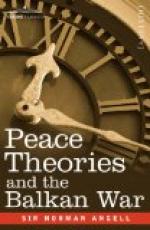In the House, Lord Palmerston once began his reply by referring to Mr. Bright as “the Honourable and Reverend gentleman,” Cobden rose to call him to order for this flippant and unbecoming phrase. Lord Palmerston said he would not quarrel about words. Then went on to say that he thought it right to tell Mr. Bright that his opinion was a matter of entire difference, and that he treated his censure with the most perfect indifference and contempt. On another occasion he showed the same unmannerliness to Cobden himself. Cobden had said that under certain circumstances he would fight, or if he could not fight, he would work for the wounded in the hospitals. “Well,” said Lord Palmerston in reply, with the sarcasm of a schoolboy’s debating society, “there are many people in this country who think that the party to which he belongs should go immediately into a hospital of a different kind, and which I shall not mention.” This refined irony was a very gentle specimen of the insult and contumely which was poured upon Cobden and Mr. Bright at this time....
It is impossible not to regard the attitude of the two objects of this vast unpopularity as one of the most truly honourable spectacles in our political history. The moral fortitude, like the political wisdom of these two strong men, begins to stand out with a splendour that already recalls the great historic heights of statesmanship and patriotism. Even now our heart-felt admiration and gratitude goes out to them as it goes out to Burke for his lofty and manful protests against the war with America and the oppression of Ireland, and to Charles Fox for his bold and strenuous resistance to the war with the French Republic.
Before indulging in the dementia which those names usually produce, will the reader please note that it is not my business now to defend either the general principles of Cobden and Bright or the political spirit which they are supposed to represent. Let them be as sordid, mean, unworthy, pusillanimous as you like—and as the best of us then said they were ("a mean, vain, mischievous clique” even so good a man as Tom Hughes could call them). We called them cowards—because practically alone they faced a country which had become a howling mob; we called their opponents “courageous” because with the whole country behind them they habitually poured contempt upon the under dog.
And we thus hated these men because they did their best to dissuade us from undertaking a certain war. Very good; we have had our war; we carried our point, we prevented the break-up of the Turkish Empire; those men were completely beaten. And they are dead. Cannot we afford to set aside those old passions and see how far in one particular at least they may have been right?
We admit, of course, if we are honest—happily everyone admits—that these despised men were right and those who abused them were wrong. The verdict of fact is there. Says Lord Morley:—




